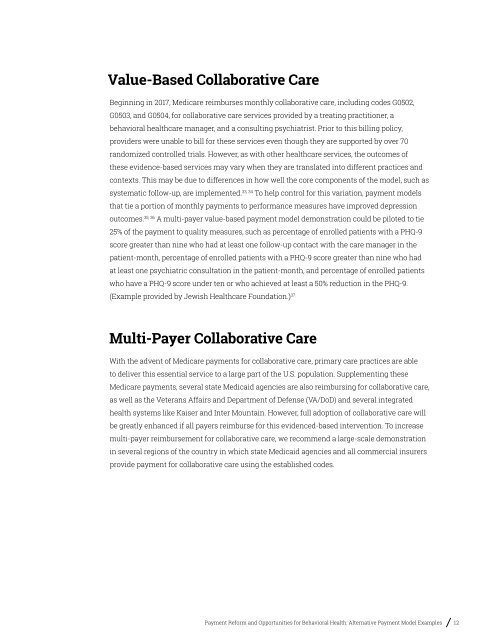Alternative Payment Models
You also want an ePaper? Increase the reach of your titles
YUMPU automatically turns print PDFs into web optimized ePapers that Google loves.
Value-Based Collaborative Care<br />
Beginning in 2017, Medicare reimburses monthly collaborative care, including codes G0502,<br />
G0503, and G0504, for collaborative care services provided by a treating practitioner, a<br />
behavioral healthcare manager, and a consulting psychiatrist. Prior to this billing policy,<br />
providers were unable to bill for these services even though they are supported by over 70<br />
randomized controlled trials. However, as with other healthcare services, the outcomes of<br />
these evidence-based services may vary when they are translated into different practices and<br />
contexts. This may be due to differences in how well the core components of the model, such as<br />
systematic follow-up, are implemented. 33, 34 To help control for this variation, payment models<br />
that tie a portion of monthly payments to performance measures have improved depression<br />
outcomes. 35, 36 A multi-payer value-based payment model demonstration could be piloted to tie<br />
25% of the payment to quality measures, such as percentage of enrolled patients with a PHQ-9<br />
score greater than nine who had at least one follow-up contact with the care manager in the<br />
patient-month, percentage of enrolled patients with a PHQ-9 score greater than nine who had<br />
at least one psychiatric consultation in the patient-month, and percentage of enrolled patients<br />
who have a PHQ-9 score under ten or who achieved at least a 50% reduction in the PHQ-9.<br />
(Example provided by Jewish Healthcare Foundation.) 37<br />
Multi-Payer Collaborative Care<br />
With the advent of Medicare payments for collaborative care, primary care practices are able<br />
to deliver this essential service to a large part of the U.S. population. Supplementing these<br />
Medicare payments, several state Medicaid agencies are also reimbursing for collaborative care,<br />
as well as the Veterans Affairs and Department of Defense (VA/DoD) and several integrated<br />
health systems like Kaiser and Inter Mountain. However, full adoption of collaborative care will<br />
be greatly enhanced if all payers reimburse for this evidenced-based intervention. To increase<br />
multi-payer reimbursement for collaborative care, we recommend a large-scale demonstration<br />
in several regions of the country in which state Medicaid agencies and all commercial insurers<br />
provide payment for collaborative care using the established codes.<br />
<strong>Payment</strong> Reform and Opportunities for Behavioral Health: <strong>Alternative</strong> <strong>Payment</strong> Model Examples 12

















